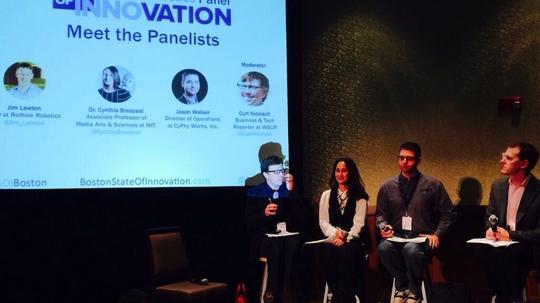
The idea of robots can often seem daunting to people. Whether it's that artificial intelligence technologies will think logically and rationally, or that they'll replace the everyday activities of humans, the general sentiment of robotics is certainly a lot for anyone to digest. Rest easy, though, mankind. At BostInno's State of Innovation, robotics professionals generally agree it's all about fostering a symbiotic relationship.
The robotics panel, moderated by WBUR's business and technology writer Curt Nickisch, examined the general state of the robotics industry in Boston and how that kind of technology will affect the various facets of our lives – work, play, healthcare and more.
"It's Something that touches a lot of the angst and fears of people as the economy develops and changes," he began.
But then Nickisch took a straw poll. Asking everyone in the room to raise their hands if they love robots, and if they want them to be continued to be made in Boston, everyone stretched their arms without hestitation.
Perhaps they're not as scary as we've been led to believe by science fiction.
"I thought it'd all be robots doing jobs in China already," said Dr. Cynthia Breazeal, Associate Professor of Media Arts and Sciences at MIT. "Job creation is around how do you let machines do the manufacturing work and let humans do more creative design work."
If people aren't afraid of a complete worldwide coup staged by robots, some may be afraid of at least losing their jobs to them. But as the good doctor mentioned, perhaps robots will allow for more dexterity in pursuing other imaginative professions.
Jim Lawton, CMO at Rethink Robotics, generally agrees but also thinks it's contingent upon the state of the job economy. One hundred years ago, he posited, most of the jobs represented by the spectators in the room weren't invented. Another hundred years from now, much of the jobs we currently undertake will similarly be gone.
"On one hand it's frightening," he said, "but it's also very exciting to see what's going to be created."
For his part, Jason Walker, Director of Operations at CyPhy Works, may have the most pessimistic point of view, albeit, perhaps the most realistic.
"I don't think any occupation is safe from robotics or A.I.," he stated bluntly.
Using self-driving cars as an example for where automated technologies like A.I. may only work to a certain capacity, all three of the panelists agree that no matter how smart the hardware or software, there's no replacement for humanistic traits.
Posed Lawton, "When a Google car stops, do I cross the street or not?" It seems a simple question on the surface but it brings up a fascinating point. We don't really know how a piece of technology like that will react in certain situations, whereas we, as human beings, can decipher facial cues and proceed from there.
It requires, as mentioned by Dr. Breazeal, "a lot of social signaling."
Of course at this point, much of the future of robotics at this point is draped in speculation. But the budding technology is here and will partially dictate the kinds of services, industries and engagement it has on our entire collective future.








